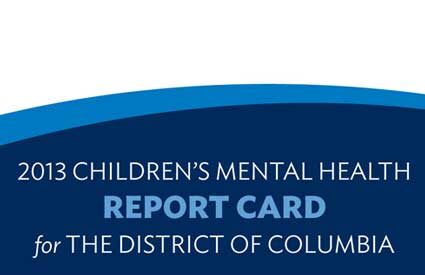The District’s Work on Children’s Mental Health Is Incomplete

WASHINGTON, DC (May 9, 2013) – A year after Children’s Law Center released a plan to improve the District’s children’s mental health system, a report card shows some progress in three key areas, but that much more work needs to be done.
“The District needs to move from making plans to taking action,” said Judith Sandalow, Children’s Law Center’s executive director. “We have the beginnings of a functioning mental health system for children, but much of the work is still in the planning stages and must be completed and implemented before we can say our children are being well-served.”
Mental health reform is essential for any other child-centered reforms to succeed. Recently the District has focused on truancy, and Tuesday the DC Council gave preliminary approval to the Attendance Accountability Amendment Act of 2013, introduced by Councilmember David Catania with Councilmembers Yvette Alexander, Marion Barry, Jack Evans, and David Grosso. But Sandalow warns that any efforts to address truancy are bound to fail unless the District also builds a quality children’s mental health system.
 “Good mental health is essential to every child’s ability to learn and succeed, just as necessary as nutrition for a hungry child or medicine for a sick child,” she said. “Without a focus on mental health, our city will not be able to improve school performance, lower dropout rates, and reduce the number of youth in the child welfare and juvenile justice systems.”
“Good mental health is essential to every child’s ability to learn and succeed, just as necessary as nutrition for a hungry child or medicine for a sick child,” she said. “Without a focus on mental health, our city will not be able to improve school performance, lower dropout rates, and reduce the number of youth in the child welfare and juvenile justice systems.”
There has been some progress since the release of Children’s Law Center’s plan last year. The District received two competitive, multi-year federal grants for mental health planning, training and service delivery. The Department of Health Care Finance put out a Request for Proposals for new managed care organizations (MCOs) that included strong language describing the responsibilities of the MCOs regarding mental health credentialing, network adequacy and data collection. A new multidisciplinary group has been formed to work on issues of pediatric and mental health integration, such as screening and psychiatric access.
However, challenges remain. One of the most significant challenges facing the District’s children’s mental health system is that no single agency is fully in charge of running the system or reforming it. The bureaucratic fragmentation prevents the District from developing a working children’s mental health system.
Further, federal funding that could be helping families is not being distributed and may be lost. The District was awarded a $4.5 million competitive federal grant to expand evidence-based home visiting programs over two years. Delays in the DC Department of Health’s contracting and procurement process mean grants haven’t been awarded to contractors, and this money could be permanently lost.
“Despite many improvements this past year, DC children still have a paucity of quality mental health services to assist them as they struggle to address problems in their families, schools, and community,” Sandalow said. “The District must do better.”
###
About Children’s Law Center
Children’s Law Center works to give every child in the District of Columbia a solid foundation of family, health, and education. We are the largest provider of free legal services in the District and the only to focus on children. Our 80-person staff partners with local pro bono attorneys to serve more than 2,000 at-risk children each year. We use this expertise to advocate for changes in the District’s laws, policies, and programs. Learn more at www.childrenslawcenter.org.
Media Contact:
202-467-4900, ext. 512